Click on images to enlarge

mass garden planting (Photo: Sheldon Navie)
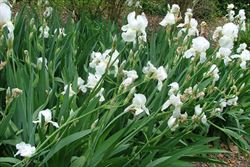
habit (Photo: Sheldon Navie)
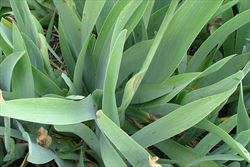
leaves (Photo: Sheldon Navie)
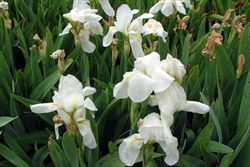
flowers (Photo: Sheldon Navie)
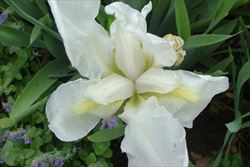
close-up of flower (Photo: Sheldon Navie)
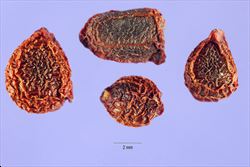
close-up of seeds (Photo: Steve Hurst at USDA PLANTS Database)
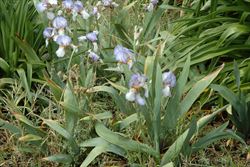
habit of the typical cultivated form of German iris, Iris germanica (Photo: Rob and Fiona Richardson)

flower of the typical cultivated form of German iris, Iris germanica (Photo: Rob and Fiona Richardson)
Scientific Name
Iris germanica L.
Synonyms
Iris florentina L.Iris germanica L. var. florentina (L.) DykesIris x germanica L.Iris x germanica L. nothovar. florentina Dykes
Family
Iridaceae
Common Names
beard iris, bearded iris, flag iris, flags, fleur de lis, Florentine iris, garden iris, German iris, orris, orris root, purple flag, tall bearded iris
Origin
This plant probably originated in the eastern parts of the Mediterranean region. Some botanists regard it to be a fertile hybrid of Iris pallida and Iris variegata, or a hybrid complex of several species, while others treat it as a species in its own right.
Naturalised Distribution
Widely naturalised in many parts of southern Australia (i.e. eastern New South Wales, Victoria, Tasmania, south-eastern South Australia and south-western Western Australia). Recently recorded as sparingly naturalised in the cooler inland parts of south-eastern Queensland.
Also naturalised in many parts of the USA.
Notes
German iris (Iris germanica) is regarded as an environmental weed in Victoria and Tasmania. It is widely grown as a garden ornamental in the temperate regions of Australia, and has become naturalised along roadsides, in waste areas and in bushland.
This species is currently of most concern in Victoria. It appears on environmental weeds lists (e.g. in the Goulburn Broken catchment) and is found in conservation areas (e.g. in You Yangs Regional Park and Yarra Bend Park) in this state. German iris (Iris germanica) has also been recorded in several conservation areas in South Australia (i.e. Belair National Park, Ferguson Conservation Park, Morialta Conservation Park and Scott Creek Conservation Park) and Tasmania (i.e. Gresswell Reserve).
Note: While other flower colours are common in cultivation, it is the white-flowered form of this species that it most common among naturalised populations. This white-flowered form is sometimes known as Florentine iris (Iris germanica var. florentina).

